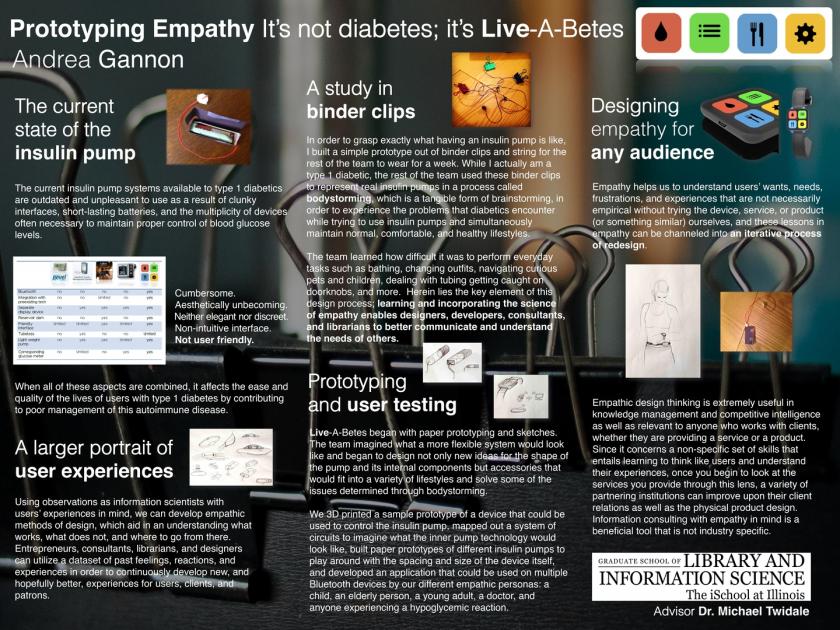
 Recently, business partners at the quarterly GSLIS Corporate Roundtable (CRT) event had the opportunity to learn more about master’s-level student projects that have application within the corporate sector. Directly following the CRT discussion about big data, seven master’s students made presentations about their work to representatives from a variety of companies including CRT sponsors Caterpillar and John Deere. Topics ranged from usability design to database design.
Recently, business partners at the quarterly GSLIS Corporate Roundtable (CRT) event had the opportunity to learn more about master’s-level student projects that have application within the corporate sector. Directly following the CRT discussion about big data, seven master’s students made presentations about their work to representatives from a variety of companies including CRT sponsors Caterpillar and John Deere. Topics ranged from usability design to database design.
Master’s student Andrea Gannon’s project on empathy and user experience, titled “Prototyping Empathy: It’s not diabetes; it’s Live-a-Betes” was selected as the top presentation by a faculty review committee. The committee appreciated the project’s innovation, noting that Gannon’s use of rapid prototyping and empathetic design was of immediate interest across a wide range of industries. According to Meg Edwards, GSLIS senior advising coordinator, who worked directly with the review committee, “Gannon’s oral presentation was professional, engaging, substantive, and well-organized.”
Below is Gannon’s abstract, along with abstracts from the other outstanding projects presented.
Andrea Gannon
“Prototyping Empathy: It's not diabetes; it's Live-A-Betes”
Abstract: Designers and developers, whether they are from corporations, educational institutions, medical facilities, or library services, face significant challenges while attempting to create products and provide services when they do not understand their users’ or clients’ needs. The Live-A-Betes project exemplifies how empathic design thinking helps communicate users’ needs, and once developers begin to look at services and products through this lens, a variety of partnering institutions can improve upon client relationships with clearer understanding of their users’ experiences.
Sophie Hou
“To Pick or Not to Pick? – A Data Archive’s Appraisal and Selection System Implementation Analysis”
Abstract: This poster presents the process that was used to determine the system requirements in order to implement an online dataset information submission system for the Research Data Archive (RDA) at the National Center for Atmospheric Research (NCAR). The poster also features the recommended solution for implementing the proposed system. The poster concludes by highlighting the benefits of such a system to any information organization that aims to provide data stewardship for longevity."
Kristin Petersheim, Andrea Gannon, Jessica Rippel
“Introducing GenDrive: A New Generation for General Motors”
Abstract: In an effort to innovatively restructure the image and marketing strategies of General Motors, our team developed a taskforce of information specialists with an actionable research agenda. Together, these individuals integrate unique skillsets related to business intelligence, data analysis, marketing/advertising, and user experience. This proposed department, GenGroup, serves as an example for the potential of business intelligence-centered research units for effective knowledge implementation throughout the GM value chain.
Kirstin Phelps, Berenice Vargas, and Chandrasekaran Jayaraman
“Listen Up! Spotify and the Case for Usability Design”
Abstract: We all have experience with bad interfaces and the confusion and frustration they bring; however, how do you create good interface that meet user needs for positive outcomes? Join us to learn about a number of easy to implement usability principles that can help create good interfaces, illustrated through the use case of a mobile app for Spotify, a streaming music site.
Jacob Rosenthal, Paige Cunningham and Matthew Macomber
“MediVine: Medical training in the age of information”
Abstract: MediVine is a proposed medical teaching system driven by user-generated content. Individual users submit questions which student teams work together to answer using an array of relevant research tools. The experience and skills students build are utilized in providing members of the public with fast, factual, and free medical information which is personalized to the users’ needs.
Ray Ostman
“Graphical Database of Citation Network Analysis”
Abstract: Citation analysis is a well-researched area within LIS, and can be furthered with new information technology. This poster is a case study of citation analysis using Neo4j, a graphical database management system, and an original database of a small citation network. Neo4j combines the data storage capabilities of databases with spatial organization and network analytics. Through the use of a graph database system, citation information and connections can be visualized and analyzed through citation analysis. The complex citation data is stored in nodes and edges (rather than tables), the data is rendered in a spatially in a graph, and then citation analysis and network analysis can be applied to the data.
Christopher Nixon
“FlxBoard – A Prototype Interface for Co-located and Distant Collaboration”
Abstract: In the workplace of the future, we need to be able to collaborate more closely on more types of information, both with people in the same room and with people on the other side of the world, and on other planets. flxBoard is a prototype interface and application under development designed from the ground up to be a multi user experience.